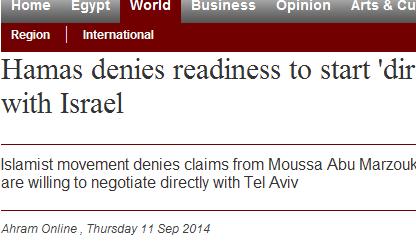 In a press statement issued on Thursday, Hamas refuted earlier media reports over the readiness of the Islamist movement to get involved in direct negotiations with Israel.
In a press statement issued on Thursday, Hamas refuted earlier media reports over the readiness of the Islamist movement to get involved in direct negotiations with Israel.
"Direct negotiation with the Zionist enemy is not part of the movement's policy, and it is not even under consideration," the statement said.
Moussa Abu Marzouk, deputy head of Hamas' politburo, had said that Hamas was ready to negotiate directly with Tel Aviv.
"We can deal with the Israeli enemy with words as we do with weapons," Al-Ahram's Arabic news website quoted him as saying to Al-Quds TV channel.
"Hamas might find itself made to do so because negotiations with the occupier [Israel] have become a request of all the people in the Gaza Strip; even the Palestinian Authority is burdened with the demands of the Palestinians."
Abu Marzouk asserted that Hamas was "so far" against implementing such a scenario, but added that "others have to be aware that it is not totally forbidden."
Before denying Abu Marzouk's claims in its statement, Fatah spokesman Ahmed Assaf said that his movement was long aware of Hamas' "secret" negotiations with Israel.
According to Egypt's state-run news agency MENA, Assaf said that such talks involved "humanitarian and political matters that do not serve the interests of the Palestinians."
He questioned Hamas' actions: "Since when do Palestinian factions negotiate with Israel on their own? Isn't this treason and a threat to the unity of Palestinians and their political position?"
The leading Fatah figure said that Palestinians are "tired of Hamas' opportunist use of religion."
"Sometimes they claim that talks are religiously forbidden, while allowing themselves to solely negotiate in other incidents," he said.
Assaf argued that the issue does not involve a disagreement between Fatah and the Islamist group as "Hamas tries to persuade the Palestinian and Arab people," but rather a series of principles that should be adopted to "make the reconciliation process fruitful."
Israel and Palestinian factions in late August reached an open-ended Egypt-brokered ceasefire to the seven-week Israeli assault on the costal enclave that left around 2,143 Palestinians dead and more than 12,000 others injured. On the Israeli side, 70 persons, including 64 soldiers, were killed.
Egypt's initiative – on which the truce deal was built – included opening crossings into Gaza for goods and humanitarian and food aid, along with medical supplies and material to repair water, electricity and mobile phone networks.
Both sides also agreed to immediately end restrictions on Palestinian boats in order to allow fishing and sailing activities up to six nautical miles.



